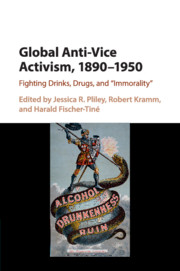Book contents
- Frontmatter
- Contents
- List of figures
- List of tables
- Notes on contributors
- Acknowledgments
- 1 Introduction: a plea for a “vicious turn” in global history
- PART I HEALTH AND THE BODY
- 2 Modernity, vice, and the problem of nakedness
- 3 “Godless Edens”: surveillance, eroticized anarchy, and “depraved communities” in Britain and the wider world, 1890–1930
- 4 Physical culture as “natural healing”: Eugen Sandow's campaign against the vices of civilization c. 1890–1920
- PART II DRINKS AND DRUGS
- PART III PROSTITUTION AND SEX TRAFFICKING
- Index
4 - Physical culture as “natural healing”: Eugen Sandow's campaign against the vices of civilization c. 1890–1920
from PART I - HEALTH AND THE BODY
Published online by Cambridge University Press: 05 July 2016
- Frontmatter
- Contents
- List of figures
- List of tables
- Notes on contributors
- Acknowledgments
- 1 Introduction: a plea for a “vicious turn” in global history
- PART I HEALTH AND THE BODY
- 2 Modernity, vice, and the problem of nakedness
- 3 “Godless Edens”: surveillance, eroticized anarchy, and “depraved communities” in Britain and the wider world, 1890–1930
- 4 Physical culture as “natural healing”: Eugen Sandow's campaign against the vices of civilization c. 1890–1920
- PART II DRINKS AND DRUGS
- PART III PROSTITUTION AND SEX TRAFFICKING
- Index
Summary
Between May 1904 and September 1905, the renowned Anglo-German physical culturist and strongman Eugen Sandow undertook a “world tour” of Africa and Asia, with performances in cities such as Johannesburg, Calcutta, and Hong Kong. At each new stop his handlers arranged interviews with local newspapers, and reporters would usually meet Sandow in the hotel bar. He would be found conspicuously enjoying a scotch or a cigar or, indeed, both. On one such occasion in June 1904, Sandow told the writer from The Transvaal Leader, “I am no teetotal crank (and in proof thereof he ordered sodas and whiskies). I do not believe in dieting.” A year later, in China near the end of his tour, Sandow was still using the same routine and trotting out roughly the same lines. In a story published in The Hongkong Telegraph, for example, the reporter who had interviewed Sandow relayed his message to readers as follows: “The grand principle about Sandow's teaching is that within certain limits you can please yourself what you do. Eat, drink and be merry, if you please … [There is] no necessity to shun the limpid ale, or the fascinating cigarette … Just be natural, and keep the dumb-bells polished.”
Life reform and the dangers of being labeled a “crank”
It seems that Sandow used these interviews as opportunities to send the public a strong and clear message indicating that he was not a “crank,” “faddist,” or teetotaller. He was not an eccentric promoting self-denial, asceticism, and abstinence from all of life's carnal pleasures, including meat, alcohol, and possibly even sex. As Antony Taylor's chapter in this volume has highlighted, many health and social reformers at the turn of the twentieth century were seen as annoying and possibly disruptive deviants, especially if they lived in alternative communities or “colonies” away from urban centers of modern “civilization.” Taylor quotes George Orwell's disapproval of vegetarians, sandal-wearers, nudists, and other “quacks,” but the American writer and world traveler Mark Twain (1835–1910) also made some caustic comments about health reformers. Twain described this kind of “crank” as the man “who eats what he doesn't want, drinks what he doesn't like, and does what he'd druther [sic] not, all while smugly announcing himself to be energetic, joyful and certain of long life, and exhorting his errant neighbour to reform.”
- Type
- Chapter
- Information
- Global Anti-Vice Activism, 1890–1950Fighting Drinks, Drugs, and 'Immorality', pp. 74 - 100Publisher: Cambridge University PressPrint publication year: 2016

